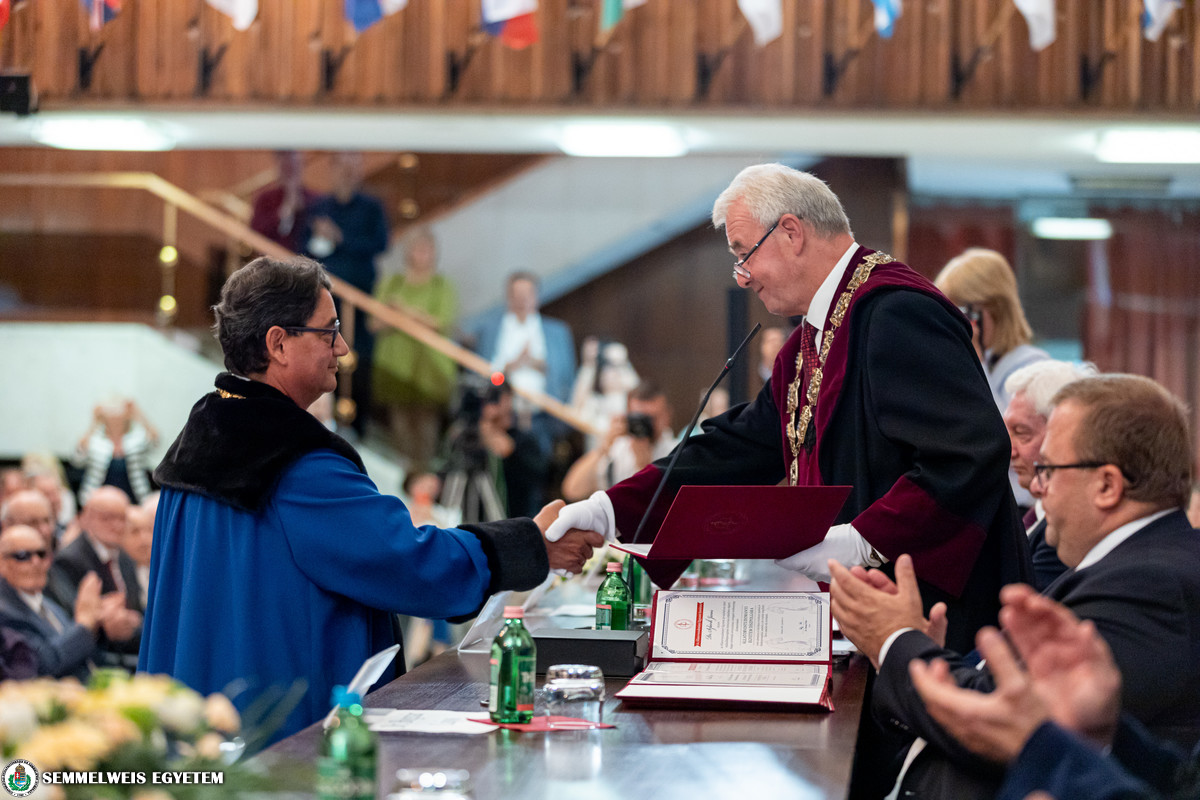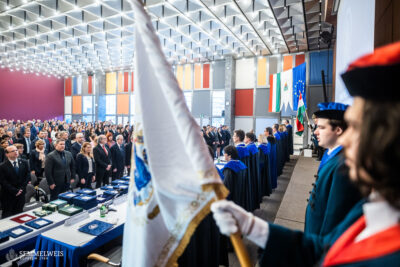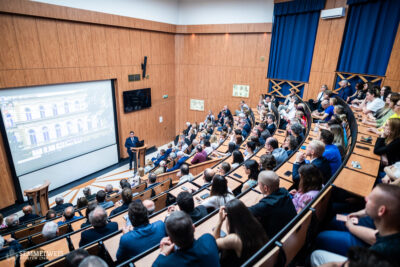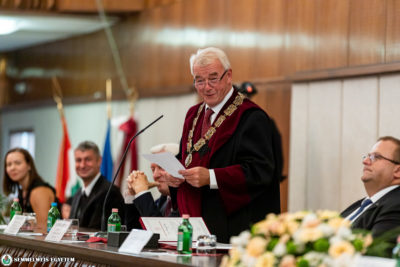 “He has established and further developed several minimally invasive endovascular catheter interventions. He has established new foundations of heart transplants in Hungary and led it to become among the leaders in the world, contributing to the creation and launch of the domestic circulatory assist device program. His most important scientific achievements are in the fields of experimental and clinical cardiac electrophysiology, non-pharmacological treatment of heart failure and arrhythmias, and interventional cardiology”, said Dr. Péter Sótonyi, Rector of the University of Veterinary Medicine, in his laudation about Dr. Béla Merkely. The Rector of Semmelweis University received his Doctor Honoris Causa title at the opening ceremony of the academic year.
“He has established and further developed several minimally invasive endovascular catheter interventions. He has established new foundations of heart transplants in Hungary and led it to become among the leaders in the world, contributing to the creation and launch of the domestic circulatory assist device program. His most important scientific achievements are in the fields of experimental and clinical cardiac electrophysiology, non-pharmacological treatment of heart failure and arrhythmias, and interventional cardiology”, said Dr. Péter Sótonyi, Rector of the University of Veterinary Medicine, in his laudation about Dr. Béla Merkely. The Rector of Semmelweis University received his Doctor Honoris Causa title at the opening ceremony of the academic year.
As Dr. Péter Sótonyi pointed out, under the leadership of Dr. Béla Merkely, Semmelweis University has played an outstanding role in the fight against the coronavirus epidemic at national level, including through the clinical epidemiology working group he led. He also plays an important role in informing the public, raising awareness of the importance of protection against infection and vaccination through interviews and lectures. “There is a nearly 250-year, 235 years to be exact, tradition of cooperation between our institutions in the field of both education and research,” the rector pointed out, stressing that since the awardee rector’s appointment, this cooperation has become closer than ever. “The University of Veterinary Medicine has conferred the title of Doctor Honoris Causa on Dr. Béla Merkely in recognition of his internationally renowned cardiological research achievements, his dedicated teaching, his outstandingly successful institutional management and professional-public activities, as well as his commitment to our alma mater”, said Dr. Péter Sótonyi, who then received the awardee with a handshake as honorary doctor of the institution.
“I am very pleased and honored to receive this honorary doctorate for several reasons,” Dr. Béla Merkely began his acceptance speech, highlighting the common roots of the University of Veterinary Medicine and Semmelweis University. As he said, the predecessor of the latter is not only the birthplace of medical education in Hungary, but also of veterinary education. In 1787, Joseph II decreed the establishment of an institute of veterinary medicine, thus establishing the teaching and research of the discipline in Hungary. In comparing the curricula of the two training programs, he highlighted the difficulty of learning anatomy: human anatomy is easier than learning the anatomy of the nearly one hundred different species of animals that are required at the University of Veterinary Medicine. Hungarian veterinary training is the third in Europe, just after Lyon and Vienna, the rector pointed out, underlining the international prestige of the institution. “It is no coincidence that common moments and common goals unite the university,” he added, quoting the words of Dr. Péter Sótonyi, who had earlier said that “the doctor heals man, the veterinarian heals humanity.” According to the Rector of Semmelweis University, veterinarians not only play an important role in the field of food safety, but they also heal our pets, contributing to the mental and physical health of humanity and our citizens, he said, thanking the Rector for the honorary doctorate conferred on him.
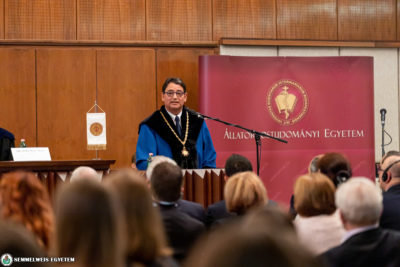 “So far, I have had the opportunity to receive the Honoris Causa title six times in different parts of the world, but this is the first time I have done so in Hungary. It is a great honor to receive this from a university with such a long tradition as the University of Veterinary Medicine,” Dr. Béla Merkely told our website. The Rector pointed out that Joseph II established the institute that provided the basis for the veterinary curriculum within the Faculty of Medicine, and as the discipline grew stronger, the training became increasingly separate, eventually becoming a separate college and then a university. He stressed that the development of vaccines has its origins in veterinary medicine and that vaccination is one of the most effective medical achievements of all time and is still a key element in the fight against epidemics. “The common future is two autonomous universities with many possible collaborations, as our disciplines are linked in many areas,” he pointed out, stressing that the University of Veterinary Medicine and Semmelweis University will continue to support each other.
“So far, I have had the opportunity to receive the Honoris Causa title six times in different parts of the world, but this is the first time I have done so in Hungary. It is a great honor to receive this from a university with such a long tradition as the University of Veterinary Medicine,” Dr. Béla Merkely told our website. The Rector pointed out that Joseph II established the institute that provided the basis for the veterinary curriculum within the Faculty of Medicine, and as the discipline grew stronger, the training became increasingly separate, eventually becoming a separate college and then a university. He stressed that the development of vaccines has its origins in veterinary medicine and that vaccination is one of the most effective medical achievements of all time and is still a key element in the fight against epidemics. “The common future is two autonomous universities with many possible collaborations, as our disciplines are linked in many areas,” he pointed out, stressing that the University of Veterinary Medicine and Semmelweis University will continue to support each other.
Ádám Szabó
Translation: Tamás Deme
Photo: Attila Kovács – Semmelweis University
